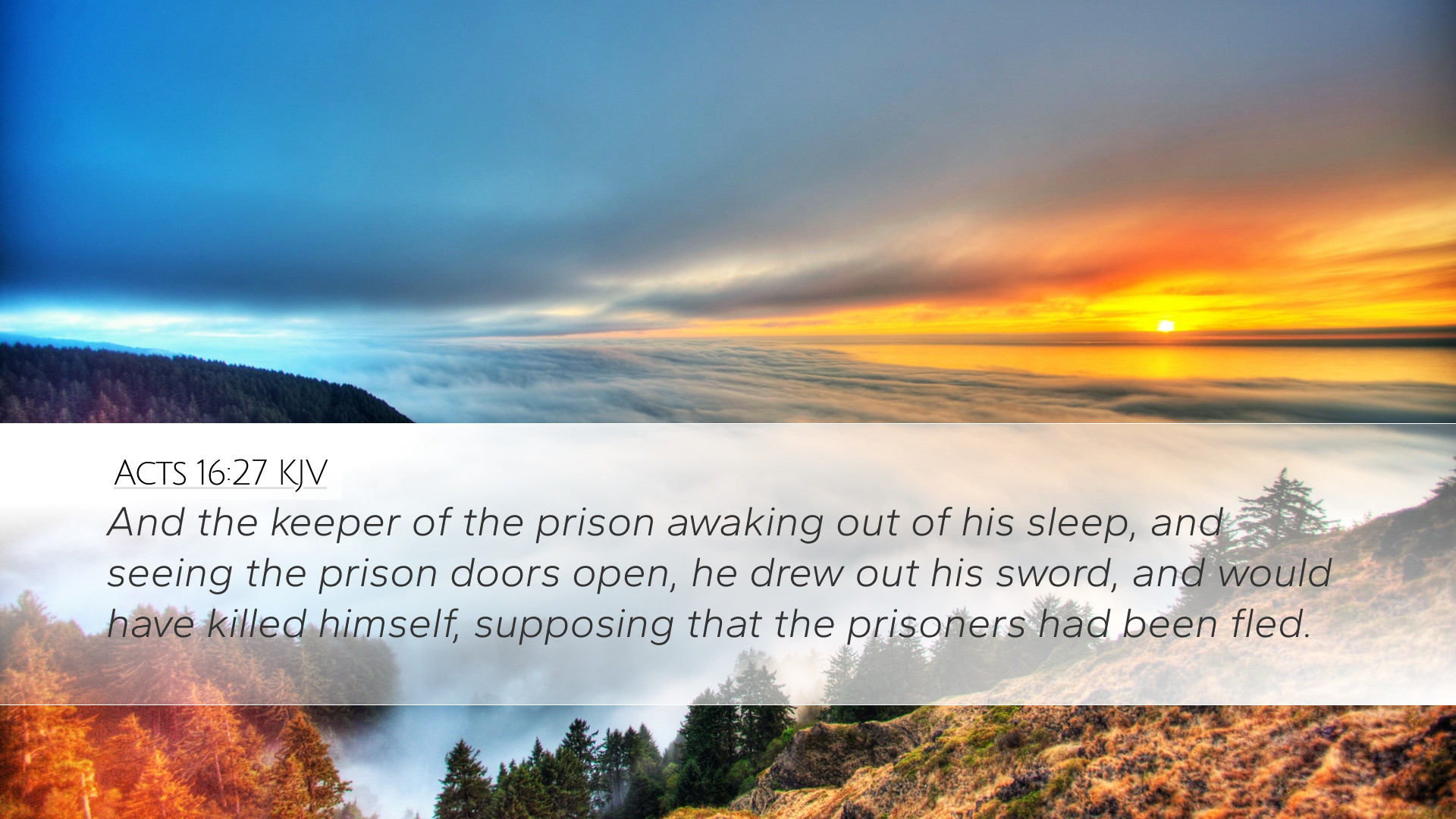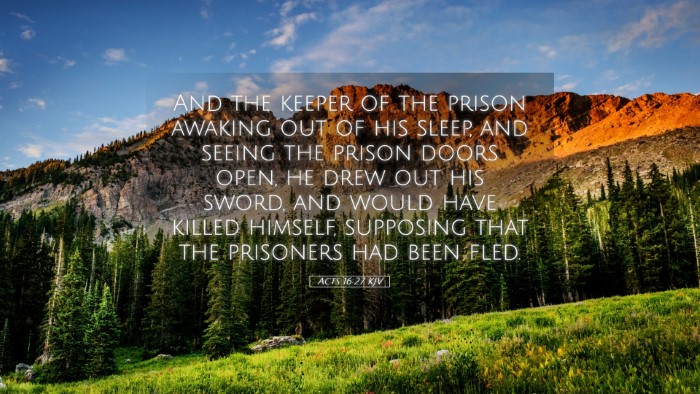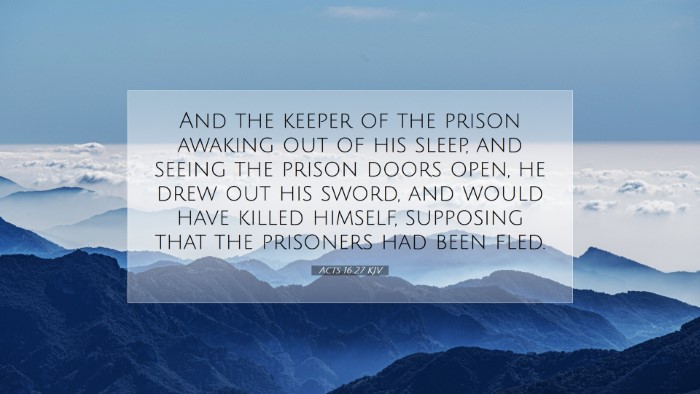Commentary on Acts 16:27
Verse: "And the keeper of the prison awaking out of his sleep, and seeing the prison doors open, he drew out his sword, and would have killed himself, supposing that the prisoners had been fled." (Acts 16:27)
Introduction
This verse from the book of Acts captures a pivotal moment in the narrative of Paul and Silas’s imprisonment in Philippi. The dramatic context, the deep theological implications, and the lessons for Christian living make this verse a focal point for reflection and discussion. Public domain commentaries shed light on the emotional weight of this scene and its broader significance within the unfolding story of the early church.
Analysis of the Verse
At the center of Acts 16:27, we find a prison keeper (or jailer) who confronts the terrifying reality of what has occurred during the night. This verse introduces themes of desperation, accountability, and the grace of God, serving as a crucial intersection between divine intervention and human action.
The Keeper of the Prison
The keeper of the prison embodies the responsibility and vulnerability of authority. As Matthew Henry notes, "he was entrusted with the safety of these prisoners, and if they escaped, his punishment would be severe." The gravity of his position drives him to a frantic response, reaffirming the idea that those in leadership bear serious consequences for the welfare of those they oversee.
Awakening from Sleep
The phrase "awakening out of his sleep" symbolizes more than a physical awakening; it suggests an illumination of understanding. Albert Barnes points out that "his sleep may be seen as a metaphor for spiritual slumber, awakening to the reality of his predicament." This moment of awakening serves as a critical turning point, not only for the keeper but also for the unfolding of God's plan through the incarceration of Paul and Silas.
The Open Prison Doors
The open doors evoke both freedom and fear. The keeper's initial reaction, assuming the prisoners had fled, illustrates a profound misunderstanding of the supernatural events that had transpired. Adam Clarke writes, "The keeper’s assumption highlights the misconceptions that often arise from a lack of discernment concerning divine workings." The doors symbolize the boundary between bondage and liberation—this emphasizes the power of God to intervene in human affairs.
Despair and Suicide
In his despair, the keeper prepares to end his life, driven by the cultural and societal expectations tied to failure. Henry emphasizes, "He preferred death to the shame of living with the responsibility of lost prisoners." This desperate act speaks to the weight of responsibility felt by individuals in positions of power and the extent to which despair can consume a person without hope.
Assumption of the Prisoners' Escape
The keeper's assumption is crucial in understanding the depth of his fear. He believed the prisoners had escaped, which would have led to his execution. Barnes observes, "It illustrates the common human tendency to leap to conclusions based on fear and insecurity." This response parallels broader themes of judgment where assumptions can lead to catastrophic decisions, reflecting a need for discernment and trust in God during crises.
Theological Implications
Acts 16:27 not only portrays a vivid scene but also encompasses significant theological themes deserving of reflection:
- Accountability in Leadership: The keeper's dread regarding his role underlines the biblical principle of accountability. Leaders in faith and secular contexts must recognize the weight of their responsibilities as they affect the lives of others.
- Human Despair vs. Divine Rescue: The transformation from the keeper's despair to his eventual salvation encapsulates the redemptive arc of the Christian narrative, illustrating the centrality of hope in God's plans.
- Divine Intervention: The open prison doors signify God's intervention. The supernatural events call us to recognize God’s sovereignty, working behind the scenes, similar to how God works in our lives, often in ways we cannot comprehend.
- Grace for the Outcast: This incident leads to the jailer’s conversion, prompting discussions around grace extended to those at the very margins of society. The keeper's transformation exemplifies the wideness of God's mercy.
Lessons for Today’s Believers
In light of this commentary, several lessons emerge for pastors, students, theologians, and Bible scholars:
- Responding to Crisis: The keeper's initial reaction illustrates the necessity of faith in moments of crisis. Rather than succumbing to fear, believers are called to seek God's presence actively.
- Understanding Accountability: Awareness of our responsibilities, especially in leadership roles, should cultivate a spirit of diligence and care towards those we serve.
- Trusting in God’s Plans: Just as the prison doors flung open without the prisoners escaping, we are reminded that God operates beyond our expectations and plans.
- Emphasizing Hope: In a world that often feels overwhelming, the narrative encourages believers to speak of hope, suggesting that despair does not have the final word when God is involved.
Conclusion
Acts 16:27 serves as a profound narrative within the wider scope of scripture, demonstrating both the human tendency toward despair and the overwhelming nature of divine grace. Through historical context, theological themes, and practical lessons, the insights from public domain commentaries enrich our understanding and encourage us to find hope amid despair. As we engage with this text, may we be inspired to bridge our understandings of accountability, divine intervention, and the power of transformation in the lives of those who encounter Christ.


